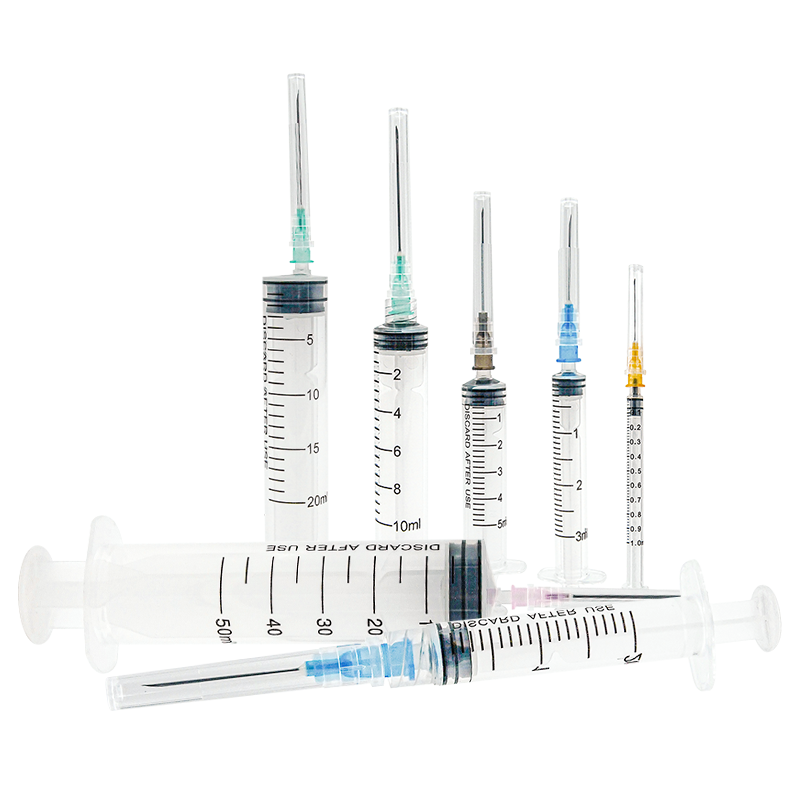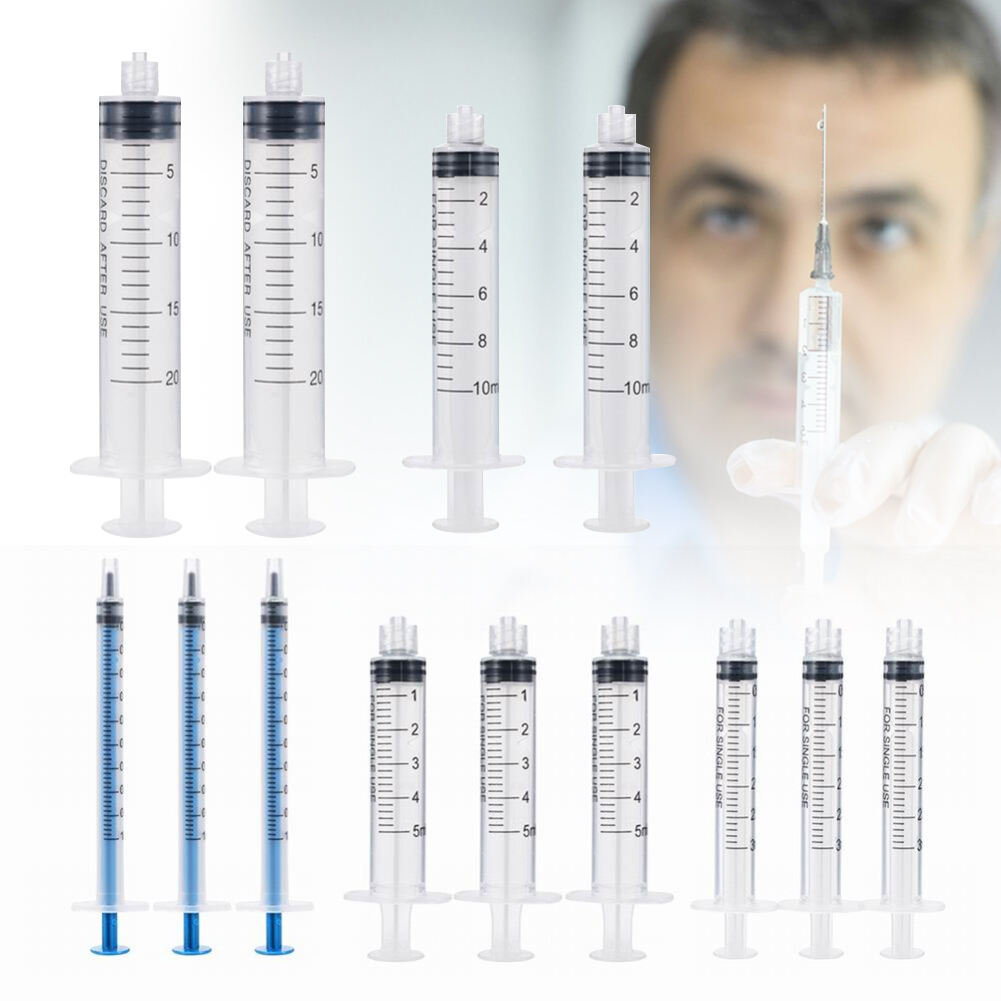Tibbi İnfilak Cihazlarının Əsas Rolunu Anlamaq
Müasir tibbi sahədə injeksiya şprisiləri dərman vasitələrinin, peyvəndlərin və digər vacib maddələrin birbaşa insan orqanizminə daxil edilməsində ən vacib tibbi alətlərdən biri kimi çıxış edir və həyatı xilas edən dərmanların dəqiq dozalarının fövqəladə dəqiqliklə tətbiqinə imkan verərək tibbi sahəni inqilab etdirmişdir. Hər gün keçirilən peyvəndlərdən təcili tibbi müdaxilələrə qədər olan prosesdə injeksiya şprisiləri dərman preparatları ilə xəstələr arasında əsas interfeys rolunu oynayır və dünyanın hər yerində tibbi xidmətin ayrılmaz komponenti halına gəlir.
Enjeksiyon şırınqlarının əhəmiyyəti, tətbiq vasitələri kimi əsas funksiyasından çox irəliləyir. Onlar tibbi müalicə zəncirində vacib bir halqa təşkil edir və dərmanların bədənin içərisindəki təyinatlı yerlərinə effektiv şəkildə çatmasını təmin edir. Bu gün dəqiqlik və təhlükəsizliyin önəm aldığı səhiyyə sahəsində bu tibbi alətlər yeni texnologiyaları və onların funksionallığını və istifadəçi təhlükəsizliyini artırmaq üçün dizayn təkmilləşdirmələrini özündə birləşdirərək inkişaf etməyə davam edir.
Müasir şırınqların təkamülü və yeniliyi
Tarixi inkişaf və texnoloji tərəqqi
İnfilak şprislarının ən erkən nümunələrindən müasir tibbi cihazlara qədərki inkişafı insan icadkarlığının və tibbi irəliləyişin sübutudur. Əvvəlki şprislər şüşə və metal kimi materiallardan hazırlanmış, tez-tez bu gün özümüz üçün verilmiş hesab edilən dəqiqliyə və təhlükəsizlik xüsusiyyətlərinə malik olmayan sadə cihazlar idi. Onillər boyu təkmilləşmə nəticəsində istehsalçılar təhlükəsizlik mexanizmləri, dəqiq ölçmə işarələri və ergonomik dizaynları özündə birləşdirən daha da inkişaf etmiş infilak şprisləri hazırlamışlar.
Müasir infilak şprisləri son dərəcə inkişaf etmiş materialşünaslıq və istehsal proseslərindən faydalanır. 20-ci əsrin ortalarında birbaşa istifadəli plastik şprislərin tətbiqi infeksiya keçmə və çirklənmə riskini əhəmiyyətli dərəcədə azaltdığı üçün böyük irəliləyiş hesab edildi. Müasir şprislərdə iynənin geri çəkilmə sistemi və iynəni qoruyan örtüklər kimi inkişaf etmiş təhlükəsizlik mexanizmləri var ki, bu da sağlamlıq işçilərini qəsdən olmasa da baş verə biləcək iynə zərbələrindən qoruyur və eyni zamanda dərmanın düzgün yerinə yetirilməsini təmin edir.
İrəliləmiş Xüsusiyyətlər və Təhlükəsizlik Mexanizmləri
Müasir inyeksiya şprisində təkrar istifadəni qarşısını alan, çirklənmə və xəstəliklərin yayılmasının riskini azaldan avtomatik söndürmə mexanizmləri kimi bir çox təhlükəsizlik xüsusiyyətləri var. Dəqiq hazırlanmış iynələr xəstənin narahatlığını minimuma endirir və dəqiq dərman dozasının yerinə yetirilməsini təmin edir. Öncədən doldurulmuş şprislərin inkişafı isə dozalama səhvlərini aradan qaldıraraq və hazırlıq vaxtını azaldaraq təhlükəsizliyi və rahatlığı daha da artırıb.
Bu innovasiyalar xəstə baxımı və sağlamlıq işçilərinin təhlükəsizliyində yaxşılaşmaları təmin etməyə davam edir. Elektron monitorinq imkanlarına malik ağıllı şprislər meydana çıxır ki, bu da həkimlərə inyeksiya nümunələrini izləməyə və müalicə protokollarına riayət olunmasını təmin etməyə imkan verir. Belə inkişaf etmiş xüsusiyyətlər sağlamlıq sahəsinin ehtiyacları və texnoloji imkanlarla uyğun olaraq inyeksiya şprislərinin davamlı inkişaf etdiyini göstərir.

Klinik Tətbiqlər və Sağlamlıq Sisteminə Təsiri
Müxtəlif Tibbi İstifadə və Tətbiqlər
İnfilak şprislarının çoxtərəfli təbiəti onları bir çox müalicə ixtisaslarında əvəzolunmaz edir. Təcili tibbi yardım sahəsində bu şprislər həyatı xilas edən dərmanların sürətli tətbiqinə imkan verir. Peşəkar vaksinasiya proqramları immunizasiyanın effektiv tətbiqi üçün infilyasiya şprislerinə güclü şəkildə əsaslanır. Xroniki xəstəliklərin idarə edilməsi tez-tez diabet kimi xəstəliklərdə müntəzəm inyeksiyalara ehtiyac duyur və bu da xəstələrin özünə inyeksiya etməsi üçün etibarlı şprisləri vacib edir.
Xüsusi infilyasiya şprisleri insulinin tətbiqindən epidural prosedurlara qədər müəyyən tibbi məqsədlər üçün nəzərdə tutulub. Müxtəlif tətbiqlər üçün uyğun şpris növlərinin və ölçülərinin seçilməsi dərmanın optimal tətbiqi və xəstənin rahatlığını təmin edir. Bu adaptivlik infilyasiya şprislerini klinik şəraitdə və evdə tibbi baxım mühitində dəyərli alətlər halına gətirir.
Keyfiyyətin nəzarəti və standartları
İnfilak şprislarının istehsalını sərtləşdirilmiş istehsal standartları tənzimləyir ki, bu da keyfiyyət və təhlükəsizliyin davamlı olmasını təmin edir. Bütün dünyadakı tənzimləyici orqanlar materiallar, sterilizasiya prosesləri və keyfiyyət nəzarəti tədbirləri üzrə sərt qaydalar müəyyənləşdirir. Bu standartlar hər bir şprisin xüsusi performans meyarlarını və təhlükəsizlik tələblərini yerinə yetirməsini təmin edir.
Müntəzəm test və təsdiqləmə prosedurları infilak şprislərinin nəzərdə tutulan istifadə müddəti ərzində bütövlüyünü və funksionallığını saxlamasını təmin edir. Keyfiyyət nəzarətinə bu cür bağlılıq sağlamlıq baxımı təminatçılarının yüksək xidmət standartlarını qorumasına və tibbi cihazların istifadəsi ilə əlaqədar riskləri minimuma endirməsinə kömək edir.
Ekoloji Nəzərdən Keçirilmələr və Gələcək İnkişaf
Uyğun istehsal praktikaları
Ekoloji həssaslığın artması ilə istehsalçılar inyeksiya şprislarının istehsalı üçün ekoloji cəhətdən təmiz alternativləri araşdırır. Bioloji parçalanma materialları və davamlı istehsal prosesləri getdikcə daha vacib amillər halına gəlir. Çətinlik isə mühitə təsiri azaldarkən məhsulun keyfiyyəti və təhlükəsizliyini saxlamaqdan ibarətdir.
Tullantı şprislərin ekoloji təsirini azaltmaq üçün innovativ geri qaytarma proqramları və tullantıların azaldılması tədbirləri həyata keçirilir. Bu səylər səhiyyə ehtiyacları ilə ekoloji məsuliyyətin tarazlanmasında sənayenin mövqeyini göstərir.
Gələcək İnnovasiyalar və Tendensiyalar
İnyeksiya şprislarının gələcəyi daha da inkişaf etmiş imkanlar təklif edir. Ağıllı materiallar və nanotexnologiyalar üzrə aparılan tədqiqatlar şprislərin funksionallığını və təhlükəsizlik xüsusiyyətlərini artırmağa kömək edə bilər. Rəqəmsal sağlamlıq sistemləri ilə inteqrasiya dərman izlənməsini və xəstələrin müalicəyə uyğunluğunun monitorinqini yaxşılaşdıra bilər.
Mikroiynələr massivi və iynəsiz inyeksiya sistemləri kimi yeni texnologiyalar ənənəvi inyeksiya şprisindən alternativ ola bilər. Bu innovasiyalar dərman tətbiqinin dəqiq aparılmasının sağlamlıq sahəsindəki vacib rolu qorunmaqla, dərman tətbiqinin üsullarını inqilab etdirə bilər.
TEZ TEZ VERİLƏN SORĞULAR
Müasir inyeksiya şprislərindəki təhlükəsizlik xüsusiyyətləri tibb işçilərini necə qoruyur?
Müasir inyeksiya şprisləri iynənin geri çəkilməsi sistemləri, iynə qoruyucuları və avtomatik söndürmə funksiyaları daxil olmaqla müxtəlif təhlükəsizlik mexanizmlərini özündə birləşdirir. Bu yeniliklər iynə zədələnmə riskini əhəmiyyətli dərəcədə azaldır və prosedurlar zamanı və sonra tibb işçilərinin təhlükəsizliyini təmin edərək təsadüfi təkrar istifadəni maneə törədir.
İnyeksiya şprislərini peyvənd tətbiqində nə qədər vacib edir?
İnfilak şprisleri, immunizasiyanın uyğun toxuma qatına birbaşa dəqiq tətbiqinə imkan verdikləri üçün peyvənd təchizatı üçün həyati əhəmiyyət daşıyır. Onların steril olması, dəqiqliyi və ardıcıl dozaların təchiz edilməsi qabiliyyəti onları bütün dünyada peyvəndləmə proqramlarında əvəzsiz edir.
İstifadədən sonra atılan şprislərlə əlaqədar ekoloji problemləri istehsalçılar necə həll edirlər?
Bəzi şirkətlər bioparçalanma xassəsinə malik materiallar hazırlayaraq, geri dönüşüm proqramlarını tətbiq edərək və tullantıları azaltmaq üçün istehsal proseslərini optimallaşdıraraq müxtəlif strategiyalar həyata keçirirlər. Bəzi şirkətlər həmçinin ciddi təhlükəsizlik və sterilizasiya standartlarını qoruyub saxlayarkən təkrar istifadə olunan komponentləri araşdırırlar.

